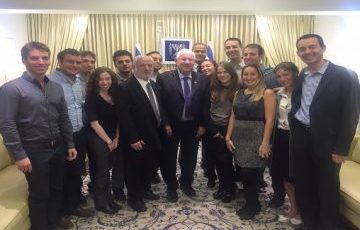By Matthew Callman, Masa Israel Teaching Fellow in Netanya
This past week, over 250 Masa Israel program participants from over 25 countries came together at Hotel Yehuda in Jerusalem for the The Wilf Family Masa Israel Leadership Summit. These five days were full of workshops, lectures, trips, and other interactive activities. The purpose of the summit was to educate the participants and give us the proper tools to become future Jewish leaders. On the last day, in order to tie the summit together, we received an article that lists the seven principles of a Jewish leader. In order to reflect on the summit, I am using those same seven principles to draw the connection between the summit and Jewish leadership.

Principle 1: Leadership begins with taking responsibility.
Prior to the conference, we had the responsibility to complete the application process for the summit, and upon acceptance, sign up for the workshops that we would be interested in attending. During the workshops, professionals from around the Israeli community came in to spread their knowledge on various topics. Workshops included the challenges facing European Jews, Jewish philanthropy, proper messaging and branding techniques, how to run a t-shirt campaign, a memorable talk by Tamir Goodman, and the opportunity to visit the Knesset. The workshops were the part of the summit where we would put in the effort in order to receive the message they were trying to send. As for myself, I took the responsible role and took copious notes so, in the future, I can go back and reflect on what I learned.

The notebook that holds all the amazing information received that week
Principle 2: No one can lead alone.
At the beginning of the program, the participants were separated into 11 teams. These would be our homeroom groups, where after each day we would come together and reflect on what we learned. It all started out on Sunday, when we completed various team building exercises at the Biblical Zoo. The purpose of these exercises was to build that atmosphere of a team. Having a unified team, will make leading it easier. Throughout the week, due the extensive workshop choices, some people may have had difficulty deciding what workshops they wanted to attend. Our homeroom groups were then used as the place where everyone talked about the workshops they attended that day. At first, we were strangers when we walked in on day one, but by day five we had many conversations, connected and shared ideas to help each other grow as individuals and leaders.

Team building at the Biblical Zoo
Principle 3: Leadership is about the future. It is vision-driven.
The purpose of the summit was to help us become the future Jewish leaders of our communities. The week started out with some important questions. These questions were not going to be answered during the summit, but they were used to spark an interest in how we can best answer those questions.
Three major questions were asked by Shmuel Rozner of the Jewish People Policy Institute during his lecture:
Why would one want to be Jewish?
Why does Judaism need to be continued?
What role can a Jewish leader play in the world?
These are powerful questions, and they laid the groundwork for the remainder of the summit. They got me thinking and, after reflecting on these questions during the week, as the conference concluded, I asked myself the question: “How can I become the best Jewish leader in my community?” With that question in mind, I can now figure out how I can grow as an individual each and every day in order to make the impact that I know I am capable of making.

I had the opportunity to speak at the gala banquet on behalf of the participants
Principle 4: Leaders learn.
Obviously, we were at a summit, so we were going to do a lot of learning, but learning should never end. During the conference, many opportunities were created to allow us to learn from each other. It never matters how one learns, as long as one is looking for new knowledge. While learning from your peers, you never know what you may find out. People have different views on and interpretations of topics, and they may make a point that you did not think of. It was great to see that, throughout the day, people were constantly asking each other about the workshops they attended and what they learned from them. The open environment at the summit, allowed for the exchange of ideas that will really help people grow as leaders.

The Open Space activity held during the summit
Principle 5: Leadership means believing in the people you lead.
As future Jewish leaders, who are we really looking to lead? The answer may vary depending on who you ask, but there is one general category that we must believe in, and it is the Jewish people as a whole. The summit gave us the opportunity to envision that. Where else could you find young Jews from all around the world under one roof? Coming from a very Jewish area on Long Island, sometimes I forget that being Jewish in other areas of the world can be very difficult. Hearing some of those stories had a huge impact on me and really opened up my mind to Judaism around the world. Now, when we go back to our respective communities, we will be focusing on not only making our communities better, but also on the worldwide Jewish community.

A packed out main hall of future Jewish leaders
Principle 6: Leadership involves a sense of timing and pace.
Can there only be one leader? Through my experiences studying leadership, there needs to be a group of leaders. Everyone has their strengths and weaknesses, and in order to be the best leader, you must surround yourself with people who not only support you, but also cover those weaknesses for you. Some people may not be ready to be the big time leader, but want to help support their peer. The summit allowed for so many great minds to not only network, but to build personal relationships, too. These connections that were formed, will give all of us the opportunity to grow at their own pace as a leader and find how they can be the best leader they can be.

Group 8 receives their certificates at the completion of the summit
Principle 7: Leadership is stressful and emotionally demanding
This week was not an easy week. We had a very packed out schedule, and a lot to learn in such a small period of time. For me, I got very little sleep because I wanted to take advantage of having so many motivated young Jews all together. Personally, I stepped outside my comfort zone and put myself out there for people to notice me. The summit may have been a roller coaster ride with many highs and lows, but the bottom line is, I am so blessed that I had the opportunity to attend the summit. I have taken so much from it, and I cannot wait to continue on my journey to be the best Jewish leader that I know I can be.

The following article was used to help me out with this post
Seven principles of Jewish leadership by Jonathan Sacks
The Jerusalem Post 6/14/2012
**Be sure to check out the article here and read another point of view on Jewish leadership**
Read more about Matthew’s experiences in Netanya on his blog.





